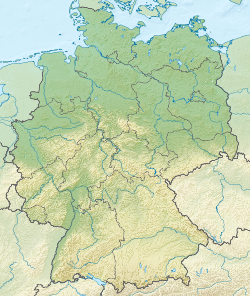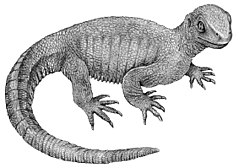Top Qs
Timeline
Chat
Perspective
Erfurt Formation
Lithostratigraphic unit in Europe From Wikipedia, the free encyclopedia
Remove ads
The Erfurt Formation, also known as the Lower Keuper (German: Untere Keuper, Lettenkeuper, Lettenkohle or Lettenkohlenkeuper), is a stratigraphic formation of the Keuper group and the Germanic Trias supergroup. It was deposited during the Ladinian stage of the Triassic period.[2] It lies above the Upper Muschelkalk and below the Middle Keuper.[1]

Remove ads
Definition
The formation was defined in Erfurt-Melchendorf in 1830 by Franz Xaver Hofmann and named for the nearby town of Erfurt.[1]
The Erfurt Formation is underlain by the Upper Muschelkalk. The lower boundary to the Erfurt Formation is the "Lettenkohlensandstein" in northern Germany and the "Grenz-bone-beds" in southern Germany.
The formation is a sequence of dolomite, lacustrine limestones, claystone, evaporites, and fluviatile sandstones. The color is usually grey but can also be brown or reddish brown. The average thickness is 60 to 80 meter, with a maximum thickness of 700 meter in the Glückstadt-Graben.[1]
The upper boundary is marked by dolomites, or claystones of the Grabfeld Formation.[1]
Remove ads
Fossil content
Summarize
Perspective
Color key
|
Notes Uncertain or tentative taxa are in small text; |
The Erfurt Formation is known for its vertebrate fossils. Different kinds of fish, amphibians and archosauriforms have been found. Usually they are found as bone beds, but in 1977 the first complete skeletons were found near Kupferzell. They include Mastodonsaurus, Gerrothorax, Plagiosuchus, Callistomordax, Nanogomphodon, Batrachotomus, Kupferzellia and Palaeoxyris friessi.[3]
Reptiles
Synapsids
Amphibians
Bony fish
Cartilaginous fish
Remove ads
References
Wikiwand - on
Seamless Wikipedia browsing. On steroids.
Remove ads























